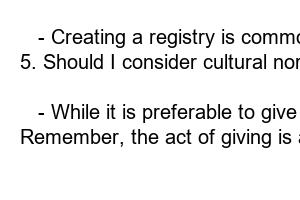지역별 결혼 축하금
Title: Wedding Gift Money by Region: What to Expect in Different Cultures
Introduction:
When it comes to weddings, gift-giving is an essential part of celebrating the union of two individuals. However, the customs and expectations surrounding wedding gift money can vary greatly across different regions and cultures. In this blog post, we will explore some fascinating traditions and practices, shedding light on the diverse ways people express their blessings and support for newlyweds around the world.
1. North America:
In North America, it is customary to give a monetary gift to the couple to help them start their new lives together. Couples often create registries, providing guests with a choice of items they desire, or give cash directly. The amount is highly individual and typically depends on the guests’ relationship with the newlyweds and personal financial capacity.
2. Europe:
In many European countries, wedding gift money plays a significant role. Guests often give cash or checks, sometimes placing envelopes within a wedding card. While specific amounts are not explicitly mentioned, it is customary to align the monetary gift with the cost of one’s attendance, historical traditions, and social norms.
3. Middle East:
In Middle Eastern countries, giving cash as a wedding gift is deeply rooted in tradition. Guests often provide money in an elaborately decorated envelope called a ‘mahr.’ The amount bestowed is based on personal relationships and the economic standing of the guest, reflecting their generosity and goodwill.
4. Asia:
In Asian cultures, including countries like China and Japan, cash gifts dominate the wedding scene. In China, it is customary to give red envelopes containing money, symbolizing good luck and prosperity. Japanese weddings often involve the presentation of envelopes called ‘shugi-bukuro’ and the amount given should be an odd number to avoid splitting the gift.
5. Latin America:
Weddings in Latin America are known for their lively celebrations and vibrant traditions. Guests commonly provide monetary gifts as a sign of congratulations and support. Some may even pin bills onto the couple’s clothing during the reception. While there are no strict rules, it is customary to give a sum that covers the cost of the guest’s attendance.
6. Africa:
Across African countries, generous monetary gifts are often presented to newlyweds. Guests recognize the significance of the occasion and contribute accordingly, sometimes surpassing their own means. The value of the gift symbolizes well wishes, stability, and support for the couple’s journey ahead.
Summary:
In summary, wedding gift money customs vary significantly by region and culture. Whether it is cash, checks, envelopes, or even pinned bills, the thought behind the gesture remains the same – to convey blessings, love, and support for the newlyweds. While specific traditions and expectations may differ, the sentiment of gift-giving unites us all in celebrating the joyous occasion of marriage.
FAQs:
1. How much money should I give as a wedding gift?
– The amount you give depends on your relationship with the couple and your financial capacity. It’s best to give a meaningful and thoughtful gift within your means.
2. Can I give a non-monetary gift instead?
– Absolutely! While money is a common choice, non-monetary gifts like household items or experiences can also be greatly appreciated, especially if they align with the couple’s preferences and needs.
3. Should I give a wedding gift if I can’t attend the event?
– It is customary to send a gift even if you cannot attend the wedding. It is a way of showing your support and well wishes for the couple.
4. Is it impolite to ask for specific gifts or cash in a registry?
– Creating a registry is common practice and not considered impolite. It allows the couple to guide their guests toward desired items or monetary contributions, simplifying the gift-giving process.
5. Should I consider cultural norms when giving a wedding gift?
– Yes, it’s essential to be aware of and respect cultural traditions and expectations. Researching customs specific to the couple’s background can help ensure your gift is appropriate and well-received.
6. Is it acceptable to give a gift after the wedding?
– While it is preferable to give a gift before or on the wedding day if possible, it is generally acceptable to present a gift within a reasonable time frame after the event. It is always better late than never!
Remember, the act of giving is a beautiful expression of love and support, regardless of the form it takes. Etiquette and cultural practices should guide us, but ultimately, it’s the sentiment that counts most in celebrating the union of two souls.

